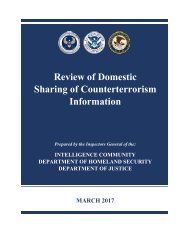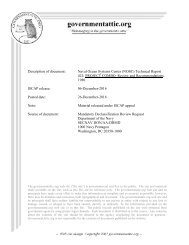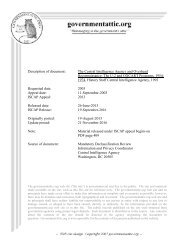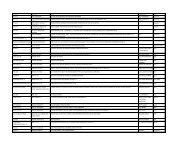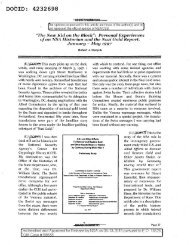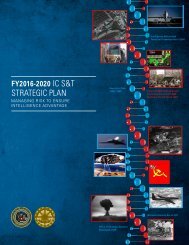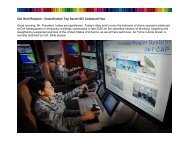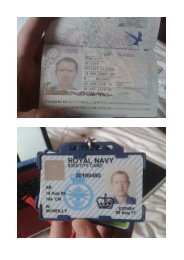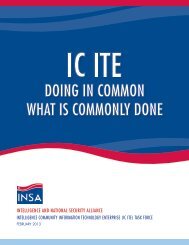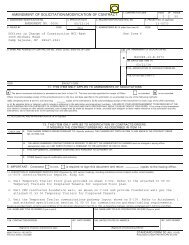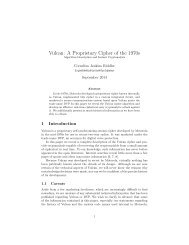nspm-04
nspm-04
nspm-04
Create successful ePaper yourself
Turn your PDF publications into a flip-book with our unique Google optimized e-Paper software.
This document is scheduled to be published in the<br />
Federal Register on <strong>04</strong>/06/2017 and available online at<br />
https://federalregister.gov/d/2017-07064, and on FDsys.gov<br />
April 4, 2017<br />
NATIONAL SECURITY PRESIDENTIAL MEMORANDUM - 4<br />
MEMORANDUM FOR THE VICE PRESIDENT<br />
THE SECRETARY OF STATE<br />
THE SECRETARY OF THE TREASURY<br />
THE SECRETARY OF DEFENSE<br />
THE ATTORNEY GENERAL<br />
THE SECRETARY OF AGRICULTURE<br />
THE SECRETARY OF HEALTH AND HUMAN SERVICES<br />
THE SECRETARY OF TRANSPORTATION<br />
THE SECRETARY OF COMMERCE<br />
THE SECRETARY OF ENERGY<br />
THE SECRETARY OF HOMELAND SECURITY<br />
THE ASSISTANT TO THE PRESIDENT AND CHIEF OF STAFF<br />
THE DIRECTOR OF THE OFFICE OF MANAGEMENT AND<br />
BUDGET<br />
THE REPRESENTATIVE OF THE UNITED STATES TO THE<br />
UNITED NATIONS<br />
THE UNITED STATES TRADE REPRESENTATIVE<br />
THE CHAIRMAN OF THE COUNCIL OF ECONOMIC ADVISERS<br />
THE CHAIRMAN OF THE BOARD OF GOVERNORS OF THE<br />
FEDERAL RESERVE SYSTEM<br />
THE DIRECTOR OF NATIONAL INTELLIGENCE<br />
THE DIRECTOR OF THE CENTRAL INTELLIGENCE AGENCY<br />
THE CHAIRMAN OF THE JOINT CHIEFS OF STAFF<br />
THE ASSISTANT TO THE PRESIDENT FOR NATIONAL<br />
SECURITY AFFAIRS<br />
THE ASSISTANT TO THE PRESIDENT FOR HOMELAND<br />
SECURITY AND COUNTERTERRORISM<br />
THE ASSISTANT TO THE PRESIDENT FOR ECONOMIC<br />
POLICY<br />
THE ASSISTANT TO THE PRESIDENT<br />
FOR TRADE AND MANUFACTURING POLICY<br />
THE ASSISTANT TO THE PRESIDENT FOR<br />
INTRAGOVERNMENTAL AND TECHNOLOGY INITIATIVES<br />
THE COUNSEL TO THE PRESIDENT<br />
THE DEPUTY ASSISTANT TO THE PRESIDENT AND<br />
NATIONAL SECURITY ADVISOR TO THE VICE PRESIDENT<br />
THE ADMINISTRATOR OF THE UNITED STATES AGENCY FOR
2<br />
INTERNATIONAL DEVELOPMENT<br />
THE ADMINISTRATOR OF THE NATIONAL AERONAUTICS AND<br />
SPACE ADMINISTRATION<br />
THE CHAIRMAN OF THE NUCLEAR REGULATORY COMMISSION<br />
THE DIRECTOR OF THE FEDERAL BUREAU OF<br />
INVESTIGATION<br />
THE DIRECTOR OF THE OFFICE OF SCIENCE AND<br />
TECHNOLOGY POLICY<br />
THE DIRECTOR OF NATIONAL DRUG CONTROL POLICY<br />
THE CHAIRMAN OF THE PRESIDENT'S INTELLIGENCE<br />
ADVISORY BOARD<br />
THE ADMINISTRATOR OF THE FEDERAL EMERGENCY<br />
MANAGEMENT AGENCY<br />
THE ARCHIVIST OF THE UNITED STATES<br />
SUBJECT:<br />
Organization of the National Security Council,<br />
the Homeland Security Council, and Subcommittees<br />
As President, my highest priority is to ensure the safety and<br />
security of the American people. In order to advise and assist<br />
me in executing this solemn responsibility, as well as to<br />
protect and advance the national interests of the United States<br />
at home and abroad, I hereby direct that my system for national<br />
security policy development and decision making shall be<br />
organized as follows:<br />
A. The National Security Council, the Homeland Security Council,<br />
and Supporting Staff<br />
The National Security Act of 1947, as amended, established the<br />
National Security Council (NSC) to advise the President with<br />
respect to the integration of domestic, foreign, and military<br />
policies relating to the national security. There is also a<br />
Homeland Security Council (HSC) -- established through Executive<br />
Order 13228 of October 8, 2001, and subsequently codified in the<br />
Homeland Security Act of 2002 -- that has the purpose of<br />
advising the President on matters pertaining to homeland<br />
security. Each Council is also responsible for the effective<br />
coordination of the security-related activities and functions of<br />
the executive departments and agencies.<br />
The security threats facing the United States in the 21st<br />
century transcend international boundaries. Accordingly, the<br />
United States Government's decision-making structures and
3<br />
processes to address these challenges must remain equally<br />
adaptive and transformative. Both Councils are statutory bodies<br />
that the President will continue to chair. Invitations to<br />
participate in specific Council meetings shall be extended to<br />
those heads of executive departments and agencies, and other<br />
senior officials, who are needed to address the issue or issues<br />
under consideration. When the President is absent from a<br />
meeting of either Council, the Vice President may preside at the<br />
President's direction.<br />
The Assistant to the President for National Security Affairs<br />
(National Security Advisor) shall be responsible, as appropriate<br />
and at the President's direction, for determining the agenda for<br />
the NSC or HSC, respectively, ensuring that the necessary papers<br />
are prepared and recording Council actions and Presidential<br />
decisions in a timely manner. The Assistant to the President<br />
for Homeland Security and Counterterrorism (Homeland Security<br />
Advisor) may, at the sole discretion of the National Security<br />
Advisor, perform those functions. When international economic<br />
issues are on the agenda of the NSC, the Assistant to the<br />
President for Economic Policy may, at the sole discretion of the<br />
National Security Advisor, perform those functions.<br />
The NSC and HSC shall have as their regular attendees (both<br />
statutory and non-statutory) the President, the Vice President,<br />
the Secretary of State, the Secretary of the Treasury, the<br />
Secretary of Defense, the Attorney General, the Secretary of<br />
Energy, the Secretary of Homeland Security, the National<br />
Security Advisor, the Homeland Security Advisor, and the<br />
Representative of the United States to the United Nations. The<br />
Director of National Intelligence and the Chairman of the Joint<br />
Chiefs of Staff, as statutory advisors to the NSC, shall also be<br />
regular attendees, as will the Director of the Central<br />
Intelligence Agency.<br />
When international economic issues are on the agenda of the NSC,<br />
the NSC's regular attendees will include the Secretary of<br />
Commerce, the United States Trade Representative, and the<br />
Assistant to the President for Economic Policy.<br />
The Assistant to the President and Chief of Staff (Chief of<br />
Staff to the President), the Counsel to the President, the<br />
Deputy Counsel to the President for National Security Affairs,<br />
and the Director of the Office of Management and Budget are<br />
invited as attendees to any NSC meeting.
4<br />
In addition to the NSC and HSC, there is also a single NSC staff<br />
within the Executive Office of the President that serves both<br />
the NSC and HSC. The staff is composed of regional, issuefocused,<br />
and functional directorates and headed by a single<br />
civilian Executive Secretary, pursuant to 50 U.S.C. 3021, who is<br />
also the Chief of Staff. All policy and staff activity<br />
decisions will be transmitted to the Executive Secretary for<br />
appropriate distribution and awareness. The purpose of the<br />
staff is to advise the President, the National Security Advisor,<br />
the Homeland Security Advisor, the NSC members, the HSC members,<br />
and others in the White House; to facilitate the implementation<br />
of Administration policy; and to help coordinate the nationalsecurity-related<br />
activities of the executive departments and<br />
agencies.<br />
B. The Principals Committee<br />
The Principals Committee (PC) shall continue to serve as the<br />
Cabinet-level senior interagency forum for considering policy<br />
issues that affect the national security interests of the United<br />
States. The PC shall be convened and chaired by the National<br />
Security Advisor. The Homeland Security Advisor may, at the<br />
sole discretion of the National Security Advisor, also convene<br />
and chair the PC. The Chair shall determine the agenda in<br />
consultation with the appropriate committee members, and the<br />
Executive Secretary shall ensure that necessary papers are<br />
prepared, and that conclusions and decisions are communicated in<br />
a timely manner. Invitations to participate in or attend a<br />
specific PC shall be extended at the discretion of the Chair,<br />
and may include those Cabinet-level heads of executive<br />
departments and agencies, and other senior officials, who are<br />
needed to address any issue under consideration.<br />
The PC shall have as its regular attendees the Secretary of<br />
State, the Secretary of the Treasury, the Secretary of Defense,<br />
the Attorney General, the Secretary of Energy, the Secretary of<br />
Homeland Security, the Chief of Staff to the President, the<br />
Director of National Intelligence, the Chairman of the Joint<br />
Chiefs of Staff, the Director of the Central Intelligence<br />
Agency, the National Security Advisor, the Homeland Security<br />
Advisor, and the Representative of the United States to the<br />
United Nations. The Counsel to the President, the Deputy<br />
Counsel to the President for National Security Affairs, and the
Director of the Office of Management and Budget may attend all<br />
PC meetings.<br />
5<br />
The Assistant to the President and Deputy National Security<br />
Advisor (Deputy National Security Advisor), the Deputy National<br />
Security Advisor for Strategy, the Deputy Assistant to the<br />
President and National Security Advisor to the Vice President,<br />
and the Executive Secretary (who shall serve as the Executive<br />
Secretary of the PC) shall attend all of the meetings of the PC,<br />
and the Assistant to the President for Intragovernmental and<br />
Technology Initiatives may attend as appropriate.<br />
When international economic issues are on the agenda of the PC,<br />
the Committee's regular attendees will include the Secretary<br />
of Commerce, the United States Trade Representative, and the<br />
Assistant to the President for Economic Policy (who shall serve<br />
as Chair for agenda items that principally pertain to<br />
international economics).<br />
C. The Deputies Committee<br />
The Deputies Committee (DC) shall continue to serve as the<br />
senior sub-Cabinet interagency forum for consideration of, and<br />
where appropriate, decision making on, policy issues that affect<br />
the national security interests of the United States. The DC<br />
shall be convened and chaired by the Deputy National Security<br />
Advisor. The Deputy Homeland Security Advisor may, at the sole<br />
discretion of the National Security Advisor, also convene and<br />
Chair the DC. The Chair shall determine the agenda in<br />
consultation with the regular DC attendees, and the Executive<br />
Secretary shall ensure that necessary papers are prepared and<br />
that conclusions and decisions are communicated in a timely<br />
manner. Invitations to participate in or attend a specific DC<br />
meeting shall be extended by the Chair to those at the Deputy<br />
Secretary or Under Secretary level of executive departments and<br />
agencies, and to other senior officials, who are needed to<br />
address any issue under consideration.<br />
The DC shall have as its regular attendees the Deputy Secretary<br />
of State, the Deputy Secretary of the Treasury, the Deputy<br />
Secretary of Defense, the Deputy Attorney General, the Deputy<br />
Secretary of Energy, the Deputy Secretary of Homeland Security,<br />
the Deputy Director of the Office of Management and Budget, the<br />
Deputy Director of National Intelligence, the Vice Chairman of<br />
the Joint Chiefs of Staff, the Deputy Director of the Central
6<br />
Intelligence Agency, the Deputy National Security Advisor, the<br />
Deputy National Security Advisor for Strategy, the Deputy<br />
Homeland Security Advisor, the Deputy Assistant to the President<br />
and National Security Advisor to the Vice President, and the<br />
Administrator of the United States Agency for International<br />
Development.<br />
The Executive Secretary shall attend the DC meetings. The<br />
Deputy Counsel to the President for National Security Affairs<br />
may attend all DC meetings. Other senior officials, including<br />
the Deputy Representative of the United States to the United<br />
Nations, may be invited when appropriate.<br />
The DC shall review and monitor the work of the interagency<br />
national security process, including the interagency groups<br />
established pursuant to section D below. The DC shall help to<br />
ensure that issues brought before the NSC, HSC, and PC have been<br />
properly analyzed and prepared for decision. The DC shall also<br />
focus significant attention on monitoring the implementation of<br />
policies and decisions and shall conduct periodic reviews of the<br />
Administration's major national security and foreign policy<br />
initiatives. The DC is responsible for establishing Policy<br />
Coordination Committees (PCCs) and for providing objectives and<br />
clear guidance.<br />
D. Policy Coordination Committees<br />
Management of the development and implementation of national<br />
security policies by multiple executive departments and agencies<br />
typically shall be accomplished by the PCCs, with participation<br />
primarily occurring at the Assistant Secretary level. As the<br />
main day-to-day fora for interagency coordination of national<br />
security policies, the PCCs shall provide policy analysis for<br />
consideration by the more senior committees of the national<br />
security system and ensure timely responses to the President's<br />
decisions.<br />
Regional and issue-related PCCs shall be established at the<br />
direction of the DC. Members of the NSC staff (or National<br />
Economic Council staff, as appropriate) will chair the PCCs; the<br />
DC, at its discretion, may add co-chairs to any PCC. The PCCs<br />
shall review and coordinate the implementation of Presidential<br />
decisions in their respective policy areas. The Chair of each<br />
PCC, in consultation with the Executive Secretary, shall invite<br />
representatives of other executive departments and agencies to
7<br />
attend meetings of the PCC where appropriate. The Chair of each<br />
PCC, with the agreement of the Executive Secretary, may<br />
establish subordinate working groups to assist that PCC in the<br />
performance of its duties.<br />
E. General<br />
The President and the Vice President may attend any and all<br />
meetings of any entity established by or under this memorandum.<br />
This document is part of a series of National Security<br />
Presidential Memoranda, which have replaced both Presidential<br />
Policy Directives and Presidential Study Directives as the<br />
instrument for communicating relevant Presidential decisions.<br />
This memorandum shall supersede all other existing Presidential<br />
directives and guidance on the organization or support of the<br />
NSC and the HSC, including National Security Presidential<br />
Memorandum – 2 (January 28, 2017), which is hereby revoked.<br />
With regard to its application to economic matters, this<br />
document shall be interpreted in concert with any Executive<br />
Order governing the National Economic Council and with<br />
Presidential Memoranda signed hereafter that implement it or<br />
those Executive Orders.<br />
The Secretary of Defense is hereby authorized and directed to<br />
publish this memorandum in the Federal Register.<br />
[FR Doc. 2017-07064 Filed: 4/5/2017 11:15 am; Publication Date: 4/6/2017]



